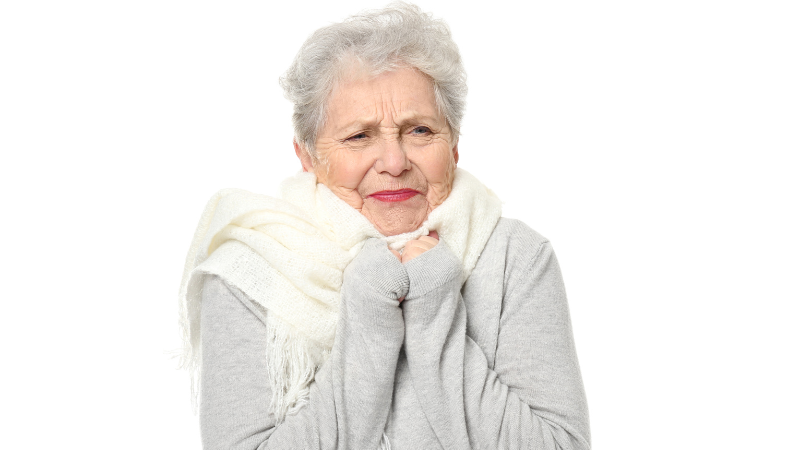

As we age, it’s natural to experience changes in our health, but one often-overlooked issue is the constant feeling of being cold. Many assume it’s just part of getting older—but in reality, frequent chills could be a sign of something more serious. New research suggests that persistent cold sensitivity in seniors may point to underlying health concerns.
That’s why it’s essential for caregivers and family members to pay close attention. By noticing signs like chronic coldness, you can help ensure your loved ones receive the care and support they need. Let’s explore some common reasons why seniors often feel cold and how to help them stay warm and healthy.
Common Reasons Behind the Cold Sensation Among Seniors
- 1. Cardiovascular Disease: Older adults with heart-related conditions, such as heart failure or peripheral artery disease, often struggle with cold sensitivity. Poor circulation—common with these conditions—reduces blood flow to the hands and feet, making extremities feel cold. A weakened heart can also impair the body’s temperature regulation.
- 2. Anemia: Anemia, a condition marked by low red blood cell or hemoglobin levels, limits the blood’s ability to carry oxygen. This affects heat distribution throughout the body, causing seniors to feel cold even when others are comfortable.
- 3. Kidney Disease: Healthy kidneys help maintain body temperature by removing waste and balancing fluids. In seniors with kidney disease, waste can build up, lowering core body temperature. Kidney disease can also cause anemia, which further contributes to cold sensitivity.
- 4. Diabetes: Older adults with diabetes may experience coldness due to poor circulation or peripheral neuropathy, which damages nerves in the hands and feet. These complications affect the body’s ability to sense and regulate temperature effectively.
- 5. Thyroid Disorders: The thyroid controls metabolism and body temperature. Hypothyroidism (an underactive thyroid) can slow metabolism and reduce heat production, often leading to cold intolerance in older individuals.
- 6. Medication Side Effects: Certain medications commonly prescribed to seniors—such as beta-blockers, antidepressants, and antipsychotics—can interfere with the body’s natural ability to regulate temperature or reduce blood flow, making seniors feel colder.
How to Help Seniors Manage Cold Sensitivity
Supporting seniors with cold sensitivity involves creating a warm, comfortable environment and addressing potential health issues. Here are a few tips:
- Keep the home warm with proper insulation and heating.
- Encourage layering—warm clothing, socks, and blankets go a long way.
- Check the thermostat regularly to maintain a comfortable indoor temperature.
- Promote light exercise and a nutritious diet to boost circulation.
- Involve elder home care professionals who are trained to assist seniors with daily activities, monitor symptoms, and ensure they remain warm and comfortable throughout the day.
For warm, personalized elderly home care services in Sarasota, Siesta Key, Longboat Key, North Port, Bradenton, South Tampa, Plant City, and Sun City Center, FL, Assisting Hands Home Care is here to provide comfort and support. Connect with us today at (813) 868-6782 to explore how we can enhance the quality of life for you or your loved one.
